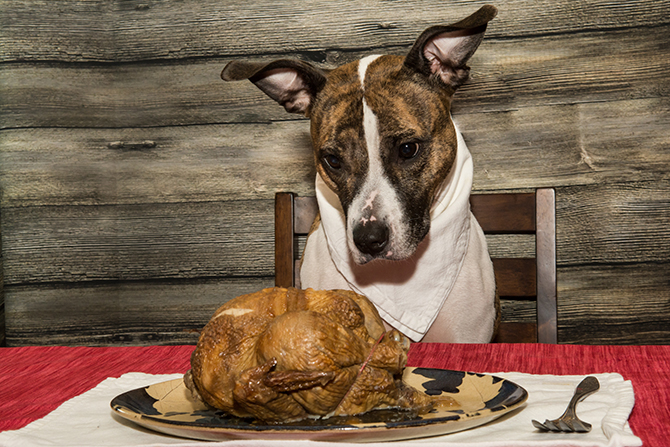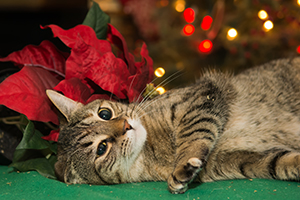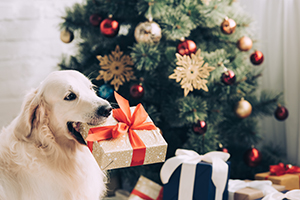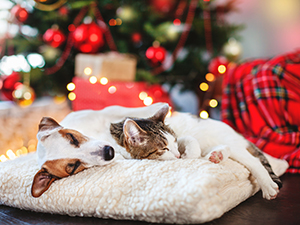PAWS DOWN…TAILS UP
TIPS FOR A HAPPY HOLIDAY WITH YOUR PET

By Dr. Jason Nicholas, The Preventive Vet
Taking a preventive approach can eliminate a great deal of stress and reduce your chances of ending up in the animal E.R. spending thousands of dollars (and several hours) over the holidays. Here are some tips on what you (and your guests) can do to ensure a safe holiday season for your pets.
Food Whether it’s turkey or stuffing, the general rule is to steer clear of feeding your four-legged friend any table scraps. Sure, a small piece of turkey (without the skin or any seasonings) isn’t likely to hurt your pup, but don’t push it. Otherwise, you could be spending the holiday nursing a very sick dog.
Keep the turkey bones away too, as they’re brittle and splinter easily. The jagged ends are easily able to puncture your pet’s esophagus, stomach, or intestines. And steer clear of the side dishes, as well. Many stuffing recipes call for lots of butter (pancreatitis risk), onions and garlic (red blood cell destruction, anemia risk), or even raisins or currants (kidney failure risk). The same is often the case for the mashed potatoes, too. Well, minus the raisins and currants, of course! So keep it safe and feed your four-legged family a pet-friendly feast instead.

Sweets Speaking of food, who doesn’t love chocolate during the holidays (or any other time during the year)? Just remember when giving or receiving chocolate as a gift, be careful not to leave it out where pets can get to it. Pets can get to more areas than you might think and know that wrapping paper is no match for the nose and teeth of a dog hot on the scent of such a forbidden treat.
Watch out too for any sugar-free sweets you or your guests might be cooking up or giving for the holidays. If they contain xylitol, a common sugar substitute, they need to be kept FAR away from your dog’s reach. Xylitol is extremely dangerous for dogs.
Kitchen Dangers Aluminum foil and plastic wrap present a real danger. When covered in food scraps and drippings, such items become a hard-to-resist treat for your pets. If ingested, these can cause inflammation or obstruction of your pet’s digestive tract.
Cooking twine/rubber bands Used in the preparation of the turkey, such objects can pose a very significant danger to your pets, particularly cats. If they get partially stuck within their digestive tract, such linear foreign bodies can insidiously lead to damage to the wall of the intestine. The result is leakage of intestinal contents into the abdominal cavity necessitating surgery and a prolonged hospital stay.

Trash Cans/Compost Bins Kitchen trash cans and compost pails are a dietary indiscretion treasure trove for mischievous dogs and cats. From turkey bones and giblets to discarded coffee grounds and filters, trash cans and compost bins contain many significant health problems for pets. Be sure to truly secure these hazards by making sure that they are closed tightly and kept safely in a secure area.
Plants Many commonly given plants and flowers can cause problems for cats and dogs, and such poisonings can range in severity from mild digestive upset to organ failure. Ironically, poinsettias, one of the more-well-known plant hazards for pets, aren’t that hazardous to pets. Keep flowers and plants truly out of reach of your pets. And do your hosts a favor by giving them only pet-safe foliage.
Gift Wrap Curly ribbon and harvest-themed twine pose a risk of linear foreign body gastrointestinal obstruction to pets, especially cats. Either don’t use them in your wrapping or make sure to dispose of them safely and promptly once the gift is unwrapped.
Your Guests Coats and purses are dangerous to pets because of what is often inside of them. Many people keep their cigarettes, gum (including sugar-free xylitol gums and nicotine replacement gums), medications, and other items (some legal, some not) in their coat pockets or bags. A pet ingesting something from a guest’s bag or coat is a prevalent scenario on the line at the animal poison control and in veterinary emergency rooms. Don’t let this happen to your pets. Hang all coats and bags safely in a closet or on a wall hook or coat rack to avoid such a pet emergency. Doing so will not just prevent your pets from getting poisoned, but it will also prevent your pets from soiling or destroying your guests’ possessions.
Weekend Guests From grooming products and medications, which can cause systemic poisoning, overnight guests and their bags are a pet hazard minefield. An easy way to keep your pets safe is requesting each visitor to keep the doors to their room and bathroom closed and that they keep all bags up off the floor.

KEEP IN MIND
During a holiday party, it’s a good idea to provide your pets with a safe area for them to spend time when the festivities begin. Doing so will not only prevent many of the gastrointestinal, poisoning, and other problems discussed earlier, but it will also keep them secure.
Enrich their area by providing water and interactive toys to keep your pets happy in this safe area. Use care with dogs that are toy/food protective, as you don’t want your environmental enrichment to lead to in-fighting amongst your pets! For cats, don’t forget to provide them with a clean and easily accessible litter box, too. Ideally, you should get your pets used to spending time in this safe area well in advance of the holidays.
For additional information to your holiday pet health and wellness questions, visit Preventive Vet at preventivevet.com --a collective of veterinarians led by Dr. Jason Nicholas.




